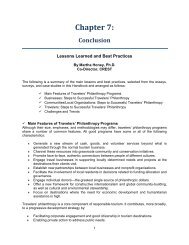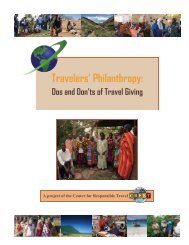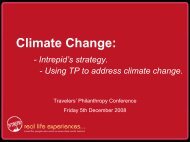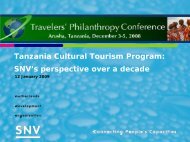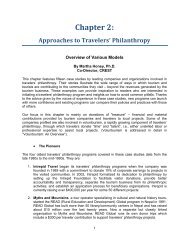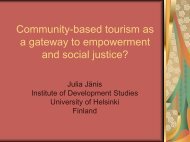Travelers' Philanthropy Handbook - Center for Responsible Travel
Travelers' Philanthropy Handbook - Center for Responsible Travel
Travelers' Philanthropy Handbook - Center for Responsible Travel
You also want an ePaper? Increase the reach of your titles
YUMPU automatically turns print PDFs into web optimized ePapers that Google loves.
so. For example, the support is <strong>for</strong> a project that is not considered a local priority or whileworthy, the internal capacity <strong>for</strong> carrying out the project is lacking.A fundamental principal in Basecamp’s travelers’ philanthropy work is, as far as possible, topromote “need driven” not “donor driven” support. The success of a project is multiplied whenthere is a clear baseline of community identified needs to provide a template <strong>for</strong> selectingprojects. We refer to this as “local ownership” of the project where the level of communityengagement and local support in the project is high.At times the community may not be aware of a more abstract sustainability “need” such asclimate change which is not yet felt as strongly as, <strong>for</strong> example, poverty. However, Basecamp’sexperience is that as soon as climate change is brought <strong>for</strong>th in terms of the rate of extinction offlora and fauna globally and the “need” <strong>for</strong> local adaptation and mitigation is explained,community awareness is raised and it is often embraced as a local “need”. Local ownership andrelevance is thereby created.In attempting to create a checklist of “be aware” issues with regards to donor driven funding,Basecamp Foundation tries to keep in mind the five following rules of thumb:1. Core CompetenceProjects where the relevant skills and competence are not readily available should best beavoided. However, the risk can be managed in cases when a strong partner with the rightcompetence comes onboard and takes a lead role in the project. A good example is thepartnership, roles, and responsibilities between Basecamp Foundation and Africa Impact, aspecialist organization on Voluntourism. In this case, the partners decided to work together inclose collaboration although Basecamp at the start had marginal experience in the field ofvoluntourism and would not have initiated the project without a core competence partner.2. Over-CommittedOver-commitment is a well-known problem to most ofus. There are so many interesting and importantcauses to support that it is almost impossible to sayno! Yet, over commitment turns out to be one of thebiggest reasons <strong>for</strong> creating a “lose-lose”circumstance instead of a “win-win” situation. Thedonor loses his or her money with little or no return,the project facilitator (Basecamp) loses credibilityand trust in the market and with the community, andthe community loses faith, while the problem remainsunsolved. This is a situation where the projectfacilitator needs to be diligent and assess the internalresources carefully be<strong>for</strong>e committing to take themoney from the donor and promise results to the community.Naboisho Conservancy, Kenya.Credit: Basecamp FoundationTo exemplify the risk of over-commitment, this little story can be useful. Late in 2008, we wereapproached by a family foundation that had visited Basecamp Masai Mara and was willing tofund a community health center in a nearby Maasai village. The project fit well in under a largerprogram called Basecamp Green Villages and Mara Naboisho Conservancy. BasecampFoundation had recently established a private conservation area outside the Masai MaraNational Reserve on private Maasai owned land. The purpose of the Green Village projectsurrounding the conservation area was to support the building of more secure and self-126




